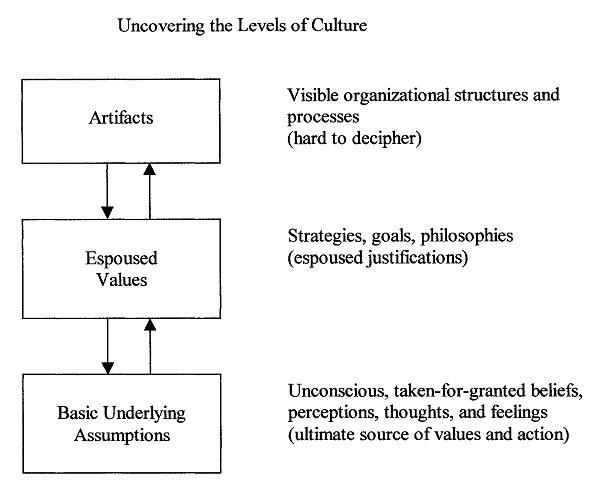Organizational culture theory

Organizational Culture Theory
Acronym
N/A
Alternative Name
Corporate culture
Main dependent construct(s)/factor(s)
Performance, organizational effectiveness, employee commitment, employee satisfaction.
Main independent construct(s)/factors(s)
Organizational culture type, organization culture strength, and culture congruence.
Concise description of theory
Different concepts of culture, stemming from two distinct disciplines (anthropology and sociology), have been applied to organizational studies since the early 1980s. These two underlying disciplines represent different paradigms in Burrell and Morgan’s (1979) framework, and have contributed to the emergence of the different theories and frameworks of organizational culture in the academic literature. Anthropology takes the interpretivist view and sees culture as a metaphor for organizations, defining organizations as being cultures. On the other hand, sociology takes on the functionalist view and defines culture, as something an organization possesses. Despite the separate definitions of organizational culture, there seems to be a movement towards a general consensus.
The most widely used organizational culture framework is that of Edgar Schein (1988), who adopts the functionalist view and described culture as a pattern of basic assumptions, invented, discovered, or developed by a given group, as it learns to cope with its problems of external adaptation and internal integration, that has worked well enough to be considered valid and, therefore is to be taught to new members as the correct way to perceive, think, and feel in relation to those problems.
In Schein’s (1988) model, culture exists on three levels:
1. Artifacts – Artifacts are difficult to measure and they deal with organizational attributes that can be observed, felt and heard as an individual enters a new culture. 2. Values – This level deals with the espoused goals, ideals, norms, standards, and moral principles and is usually the level that is usually measured through survey questionnaires. 3. Underlying assumptions – This level deals with phenomena that remain unexplained when insiders are asked about the values of the organizational culture. Information is gathered in this level by observing behavior carefully to gather underlying assumptions because they are sometimes taken for granted and not recognized. According to Schein, the essence of organizational culture lies in this level.
Source: Schein, E. H. Organizational Culture. WP 2088-88. Sloan School of Management Working Papers, Massachussets Institute of Technology, 1988.
Diagram/schematic of theory
Source: Schein, E.H. Organizational Culture and Leadership, Jossey-Bass, San Francisco, 1992, Figure 9.
Originating authors(s)
Edgar Schein, Andrew Pettigrew
Seminal articles
Pettigrew, A.M. “On Studying Organizational Cultures,” Administrative Science Quarterly (24:4), 1979, pp. 570-581.
Schein, E.H. Organizational Culture and Leadership, Jossey-Bass, San Francisco, 1985.
Schein, E.H. Organizational Culture and Leadership, 2nd edition, Jossey-Bass, San Francisco, 1992.
Smircich, L. “Concepts of Culture and Organizational Analysis,” Administrative Science Quarterly (28:3), 1983, pp. 339-358.
Originating area
Social anthropolgy, Social psychology, Organizational psychology
Level of analysis
Organization, group, individual
IS articles that use the theory
Alavi, M., Kayworth, T. R., and Leidner, D. E. “An Empirical Examination of the Influence of Organizational Culture on Knowledge Management Practices,” Journal of Management Information Systems. (22:3), 2005-2006, pp. 191-224.
Bradley, R. V., J. Pridmore, T. A. Byrd, "Information Systems Success in the Context of Different Corporate Cultural Types: An Empirical Investigation," Journal of Management Information Systems (23:2), 2006, pp. 267-294.
Cooper, R.B. “The Inertial Impact of Culture on IT Implementation,” Information and Management (27:1), 1994, pp. 17-31.
Hatcher, M. “A Video Conferencing System for the United States Army: Group Decision Making in a Geographically Distributed Environment,” Decision Support Systems (8:2), 1992, pp. 181-190.
Iivari, J., and Huisman, M. “The Relationship Between Organizational Culture And The Deployment of Systems Development Methodologies,” MIS Quarterly (31:1), 2007, pp. 35-58.
Jones, M. C., Cline, M., and Ryan, S. “Exploring knowledge sharing in ERP implementation: an organizational culture framework,” Decision Support Systems (41:2), 2006, pp. 411-434.
Leidner, D.E., and Kayworth, T. “Review: A Review of Culture in Information Systems Research: Toward a Theory of Information Technology Conflict,” MIS Quarterly (30:2), 2006, pp. 357-399.
McDermott, C.M., and Stock, G.N. “Organizational culture and advanced manufacturing technology implementation. Journal of Operations Management (17:5), 1999, pp. 521-533.
Nahm, A.Y., Voderembse, M.A., and Koufteros, X.A. “The Impact of Organizational Culture on Time-Based Manufacturing and Performance,” Decision Sciences (35:4), 2004, pp. 579-607.
Ramamurthy, K. and King, W.R. “Computer integrated manufacturing: An exploratory study of key organizational barriers. International Journal of Management Science (20:4), 1992, pp. 475-491.
Robey, D., and Markus, M. L. “Ritual in Information System Design,” MIS Quarterly (8:1), 1984, pp. 5-15.
Ruppel, C. P., and Harrington, S. J. “Sharing Knowledge Through Intranets: A Study of Organizational Culture and Intranet Implementation,” IEEE Transactions on Professional Communication (44:1), 2001, pp. 37-52.
Tan, B. C. Y., Wei, K. K., Watson, R. T., Clapper, D. L., and McLean, E. R. “Computer-Mediated Communication and Majority Influence: Assessing the Impact in an Individualistic and a Collectivistic Culture,” Management Science (44:9), 1998, pp. 1263-1278.
Zammuto, R. F., and O’Connor, E. J. “Gaining Advanced Manufacturing Technologies' Benefits: The Roles of Organization Design and Culture,” The Academy of Management Review (17:4), 1992, pp. 701-728.
Links from this theory to other theories
External links
http://en.wikipedia.org/wiki/Organizational_culture, from Wikipedia, the free encyclopedia.
http://hdl.handle.net/1721.1/2224, Organizational Culture by Edgar Schein (1988), Sloan School of Management, Massachussets Institute of Technology Working Papers.
Original Contributor(s)
Oluwakemi Onwuchekwa
Please feel free to make modifications to this site. In order to do so, you must register.
Return to Theories Used in IS Research
